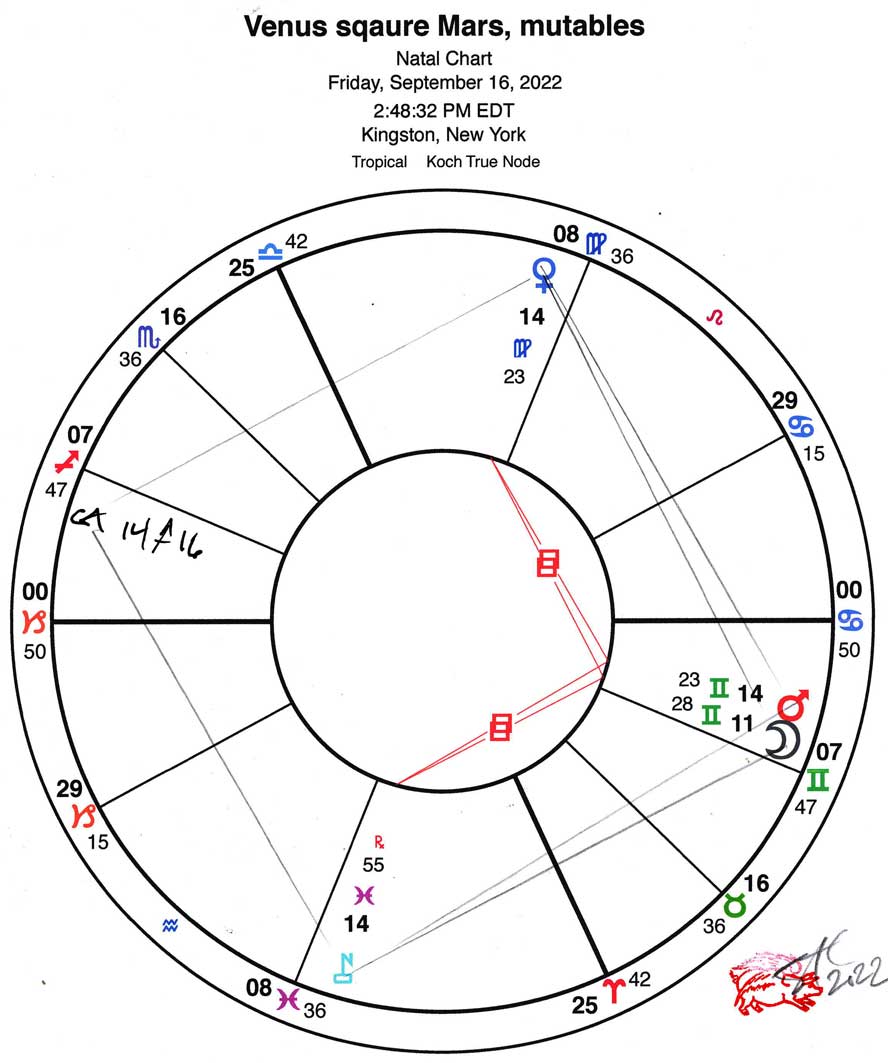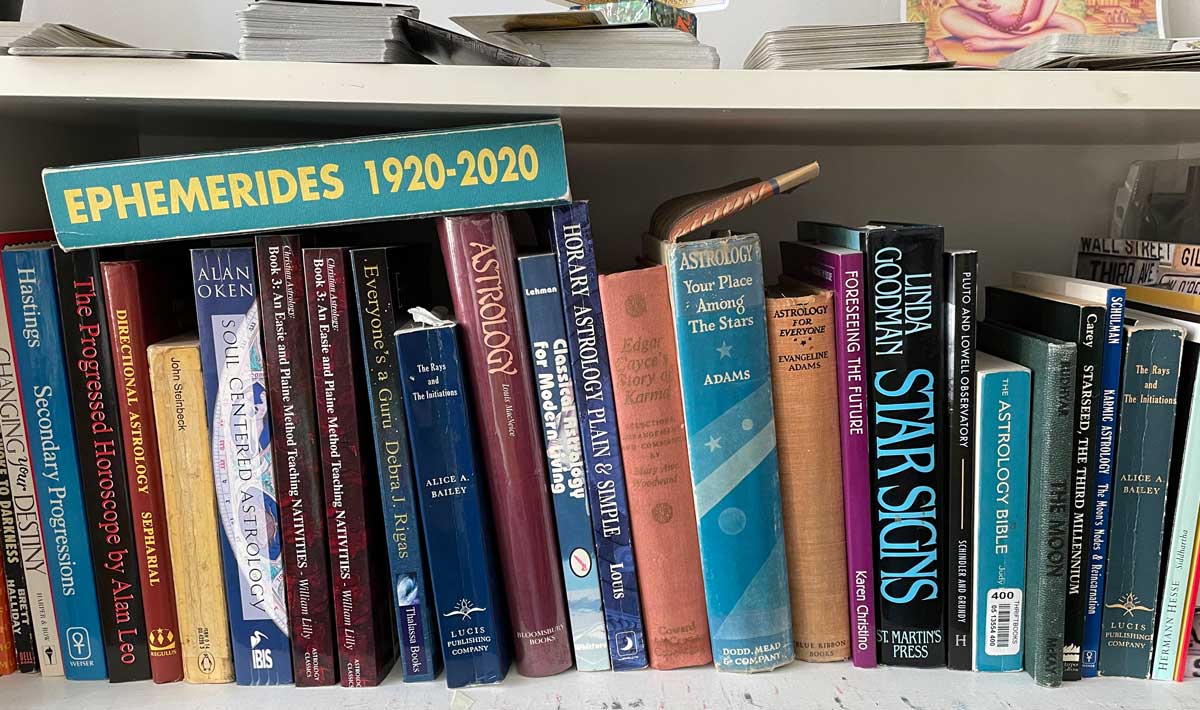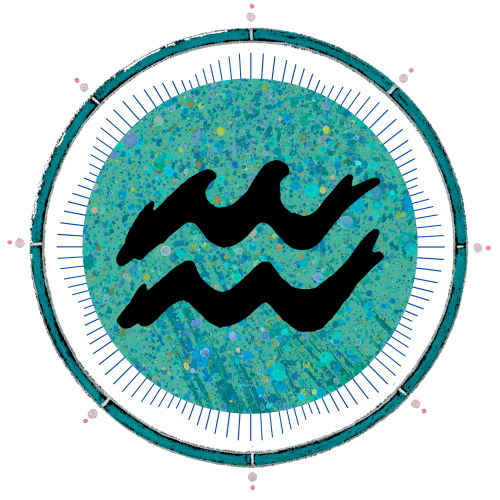
By Eric F. Coppolino
VENUS AND MARS FORM A SQUARE aspect in the mutable signs Virgo and Gemini on Friday, Sept. 16. This is one of the most interesting and potentially challenging aspects in astrology, the more so because it describes a diversity of matters that relate to gender identity, internal sexual dynamics and how someone works out their emotions and desires.Venus and Mars are all about human experience. They relate ideas such as come hither, let’s get cozy, you’re adorable, snag the guy, get the girl and let’s fuck. Dogs understand these ideas. People seem to have more confusion about them.
Everyone has Venus and Mars in their chart. From its origins, astrology was visionary about this: nobody is strictly male or female; we all possess some proportion of the two. There is even an androgynous influence, Mercury.

The question is how these factors relate to one another. Are they balanced? Do they argue? Are one’s own inner masculine and feminine in some harmony? In what style are they expressed?
For the square aspect that is happening now, and generally, the question is: what do you need to work out for yourself that you’re projecting onto others?
Venus in Virgo, Mars in Gemini
Venus is presently in Virgo and Mars is in slow and powerful in Gemini, because it’s about to be retrograde. The mutable signs tend to experience and express aspects on the mental level. That can be helpful in sexual matters because it describes an opportunity to put feelings into words. Yet this could also result in the sense of being alienated from the underlying emotions and sensations involved.
The real work of the mutable signs is integrating the mental with the emotional. Often the two dimensions of experience are alien to one another. People often think one way, and feel another way — that can lead them to act a third way that does not resemble either thinking or feeling.
Venus — what we think of as a feminine principle — is in Virgo, in contact with the earthy possibilities, aided by the Sun in this sign. Mars in Gemini goes right to the mental level, and can be polarized. Venus is really square two different concepts of Mars. They could shape up to be desire and aggression; passion and anger.
These may or may not be doing the work of integration. Venus is there as a reminder to do so.
We have real work to do on matters of sexuality, and there are few places and times when this is considered appropriate. It is rare that people make the shift from sexual identity to actual feelings, and often, identity is used as a way to avoid the discussion.
The Presence of Nessus
Centaur planet Nessus is in Pisces, and remarkably, both Venus and Mars make exact contact with it, to the degree. This is called an aspect pattern — when multiple planets line up for the photo. Nessus has much in common with Pisces in that when a centaur is present, the theme goes to healing deep and often invisible material. [Read more about Nessus.]
Nessus has many implications pertaining to the results of sexual experiences of the past. It can carry trauma, including the trauma of hearing about nothing but trauma all the time, and associating sex with nothing but. We seem to live in a time when it is forbidden to associate sex with anything other than porn, rape, LGBT politics and marriage.
That leaves out fun, friendship, communication, self-exploration, mutual exploration, curiosity and celebrating life. We live in a time when most men might agree that it’s illegal for them to be attracted to a woman. This is tough on men — but the question is, where does it leave women? And why?
The presence of Nessus in an aspect pattern says study the whole story arc of any experience associated with the pattern. Include the whole past and the probable outcome at the present course and speed. Finally, Nessus says: take responsibility for any experience in question, and also for healing its results.
This is all but verboten in a world where sex is always said to be someone else’s fault, never one’s own choice. Kids (and adults) are told that ‘consent’ can be withdrawn at any time, including two weeks or ten years later. And to think, sexophobia was pretty bad before all of this was foisted on the hapless public.

The Presence of the Great Attractor
Finally, there is one last point to consider in this grand-cross pattern: The Great Attractor. Located in mid-Sagittarius, the Great Attractor is the focal point of our immediate group of about 100,000 galaxies. From Earth, it is in the same direction as the Galactic Core. But the core of our galaxy is 25,000 light years away, while the Great Attractor may be about 400 million light years away (nobody really knows).
The Great Attractor’s influence is to bend personal events around space and time. When the GA is in the picture, what you do extends far beyond the personal and may have effects and implications beyond what you’re aware of. In this situation, the Great Attractor is a reminder that your healing matters to others, including people you will never meet.
The Great Attractor brings in the spiritual dimension of how there are no separate interests. Your influence reaches far beyond your awareness. There is more of course; if you are curious, read my article A Vast Migration of Souls.
Learn more about the Great Attractor and Laniakea.

By the Books: Venus Square Mars
Excerpted from Astrology Revealed by Eric Francis
I SAID THAT EARLIER THAT ASTROLOGY is a study in comparative literature, though it also has a touch of investigative reporting to it. To learn astrology, to study your own chart, and to handle cases, you need to be a good researcher, and an excellent listener. Then you need to present your findings.Astrology books and other sources present an over-abundance of data. The question is, how do you sift through it, evaluate it, and put it to work? How do you spot the strengths and weaknesses of what is presented?
There is a genre of books that take the “cookbook” approach to astrology, attempting to list every placement and every aspect. These commentaries need to be approached with caution, thought through carefully, and tested against lived reality. I also find it helpful to compare what different books say about the same topic, such as an aspect.
Developing Aspect Sensitivity
The goal of learning to read a chart is to get beyond the cookbook definition and cultivate sensitivity to what the chart is saying, in its context. This is called aspect sensitivity; it’s the ability to read something original about aspects, in the context of the chart.
To read a chart means to read without seeking external references. To develop the background and build up reference material, all students go through a phase of studying cookbooks (or websites) and trying to make sense out of them. I stopped doing that as soon as I got involved in studying Chiron, and then the charts just started speaking to me.
When looking at certain aspects, I sometimes still check in with the references of a few authors I trust. Part of reading is learning to develop that trust. However, it’s essential to be able to read the chart on the fly, and also to place the aspect or pattern directly into the context of the client’s life.

The Example of Venus Square Mars
Just for a good time, let’s try some comparative literature with one aspect — Venus square Mars. I just walked down the street and visited the Planet Waves office, where I keep most of my astrology collection, and looked up a number of interpretations for this aspect. I chose it because it’s considered one of those “challenging” aspects with a bad rap, and I wanted to contrast how the different authors, from various time periods, handled it. What common themes are there? Who departs from them? Does anyone have something relevant to say? It’s been a while since I looked at any of these aspect delineations.
Straight away, I noticed an old problem. None of the books reference the fact that Venus square Mars will manifest differently depending on whether it occurs in the cardinal, fixed or mutable signs. For example, you could have this aspect from Aries to Cancer (cardinal), Taurus to Aquarius (fixed), or Virgo to Sagittarius (mutable).
These will have a little in common, though using what cross the aspect is on will give you a whole other result, and a very different feeling tone. Only one author makes passing reference to this distinction. The rest leave this essential matter it out completely.
Isabel Hickey: ‘Lower’ Mars vs. ‘Higher’
Let’s start with someone I consider to be a reliable source: Isabel Hickey, from her book Astrology: A Cosmic Science. Hickey does not say this anywhere in her book, but she was a devoted student of Alice A. Bailey. Her daughter told me that Hickey read her “voraciously.” This is responsible for a certain spin in her work. Bailey is also an important influence in my work. Let’s see how she does.
Of Venus square Mars, she writes, “Emotions and passions need controlling. Can be cruel and ruthless if individual is lower martial type. Conflict between passion and love. Often leads to an early marriage due to sexual attraction. In female chart, produces emotional suffering from father or husband.” And she concludes on a chipper note: “Cruelty, inflicted on others in a past life, will come home for redemption.”
Now, would you really say this to a client? You better not! But what you want to do is listen to them describe their relationships and their problems, and notice where any of them seem to resonate. Then, it’s up to you to work with the client to come up with a creative approach to their personal material.
You have to be really careful with statements like this: “Cruelty, inflicted on others in a past life, will come home for redemption.” It’s become trendy for some astrologers to try to use the chart to tell people who they were in a past life. I don’t think this is responsible, nor do I think it’s possible to see in a chart. While a chart may give some hints as to the distant past, it’s not conclusive of specifics.
I consider the whole past life thing to be the “reincarnation effect.” Whether real or not, it’s an effect that many people experience. There are numerous sources of data pertaining to this effect, and as with all matters of verification, several sources are necessary. Those might include direct memory, a reading, hypnosis, trance channeling, a dream experience and others. The reincarnation effect is a whole topic unto itself that deserves to be on the short list for topics to include here, because it comes up so much in astrology. But this topic must be used with sensitivity cannot be taken as a given.

Llewellyn George: Get a Fire Extinguisher
Llewellyn George is a famous old writer from the days of yore. His book A-Z Horoscope Maker and Delineator came out in 1910 and was revised many times. I think I’ve got the 29th edition. He does not list specific aspects, only “Venus in Unfavorable Aspect to Mars.” This is from the old days when there were thought to be benefic and malefic aspects — trines and sextiles allegedly being benefic, squares and oppositions allegedly being malefic. (I read in an old book researching this chapter that semi-squares are allegedly “evil.”)
He writes of “bad” Venus-Mars natal contacts: “Very fond of pleasure; impulsive and amorous; difficulty through excesses and the opposite sex.” He adds, “Loss through over-liberal tendencies or carelessness and extravagance; also through fires, partnerships and too freely entering business or speculative enterprises.”
He seems to feel that this aspect is bad for everything. “At times, the social popularity or standing will be adversely affected; danger through dishonesty or loss; opposition through friends or jealousy; separation and enmity. Trouble through marriage and partnerships.”
Hoooookay. How might this information be useful? Loss by being over-liberal, or through fires? Like, your thong igniting? Advise client to keep a fire extinguisher handy?
Working Out an Internal Issue
Let’s parse this out for a second. How, besides observation (which is helpful but can allow in bias), is he coming to these conclusions? Venus square Mars is brimming with tension. Depending on all the particulars (referencing the above interpretation) this could in turn describe frustrated state of emotions or psychology that might lead a person to want to cut loose. It could also be a bit prudish, or describe tension between the two states.
The square aspect tends to alternate between two states that are gradually being integrated. With Venus and Mars in this aspect, the person might emphasize Venus one day, then Mars the next, unaware that’s what they are doing. This is usually an attempt to get the two working together. Hence, there will be the experience of inconsistency.
The jealousy bit is easy enough to surmise; Venus rules Taurus and Mars rules Scorpio and both lean toward the possessive side, and often express jealous tendencies as if there is no other option. How many people do you personally know for whom jealousy is not a significant aspect of their psychology, whether latent or overt?
The square can be seen as a kind of inner clash that the person must work out — with more or less intention and awareness.The communication between Venus and Mars will be tense, and this can be projected outward. That is the seeming brashness. It could also represent an emotional block. How is the astrologer going to help the client work this out? If you discover the aspect, where will you get ideas for how work it out?
A Classic Work: The Astrologer’s Handbook
Let’s try one more take on this aspect, from The Astrologer’s Handbook by my old friend Louis Acker and his collaborator (whom I never met), Frances Sakoian. Usually, they take a balanced view, but lose all objectivity with the Venus-Mars square.
They write: “This square causes emotional problems, especially in romance and relationships with the opposite sex. Sometimes there is a tendency to use the opposite sex or to be used by them for purely sexual gratification.”
Wow, I wish this problem were limited to only individuals with this aspect! I guess there must be hundreds and hundreds of different aspects that “cause” this problem. Let’s go on. The authors continue:
“The natives may lack good taste or refinement in their social conduct. Their desires are very strong and unless other features indicate the contrary, there is a need for self-control. Unbridled passion can cause them great harm. Men with this aspect are likely to offend women because of their coarse manners. Women with this aspect often exasperate men with their emotional temperaments.”
I guess all of these books were written before people had same-sex relationships. When exactly did that begin? Still, this does provide some guidance.

Listening to the Client
Part of what we’re seeing is these authors writing into an expectation of what astrology is supposed to be — and quite a bit of judgment about sexuality. In the days of yore (between around 400 BC and 10 minutes ago), astrologers were expected to lay the reading on the client.
Today, we must listen. Aspects are experienced differently by everyone. There is some common ground, though the specifics are critical and can make the difference between being effective as a reader, or not. If you have a one-hour reading scheduled with a client and you spend the first 54 minutes listening so you understand what they are experiencing, and the last six minutes delivering your message, that is what you do. It’s far preferable to build the listening time into the process as an architectural feature.
That’s what you have to do as someone’s astrologer: you hang out with the person until they state the problem in a way that it can be solved. Then they may have some useful ideas. If you’re curious about this particular aspect, or if the client is, there’s a fairly easy way to get a sense of what’s going on — note when Chiron passed through the square, and listen to some descriptions of the client’s life at that particular time. (In a future edition, probably the next, I will include a chapter on working with Chiron transits.)
The House and Sign Placements Makes a Difference
The houses where these planets appear are going to make a big difference, because the houses set the context. The planets describe a relationship, and the planets are placed in environments, which are also in relationship to one another.
Mars in the 12th can be a anxious or paranoid, and prone to keep secrets; what is in the 12th can also have an extra tendency to lurk beneath the level of liminality; you might keep an ear open for that. Venus in the 12th can be evasive and prone to being driven by fantasy. Anything in the 12th might have a little cloud of denial around it.
You need to listen for the details. Mars in the 8th will be sexually curious and provocative, potentially quick to connect with another, and given to a certain kind of risk. Venus in the 5th can be playful and expressive; Venus in the 3rd might want to talk a lot, and word play can be as sexy as physical play. The houses provide the context for the reading — but you still have to suss out the placements with the help of the client.
The signs will count too. For example, if Mars is in a feminine sign and Venus is in a masculine sign, that will cast the aspect in an interesting way. If you tune into those details — and study the whole aspect pattern, including any of the newer discoveries that are likely to get into the mix — you will have a lot more information to work with.

From the Aspect to the Planets
What if we go from the other direction — starting with what a square is?
Michael Meyer, in his classic work A Handbook for the Humanistic Astrologer, writes, that it’s about “the exteriorization and actualization of relationship. The giving of concrete form. Crisis and the need to take clear-cut action. Confrontations and their results. Creative tension. Solid power.”
Now that is helpful. The square would seem to want to express something in a tangible way. So the question might be: what is someone with this aspect trying to manifest? And how is that working for them? Even if some of the above commentaries describe their behavior — and they might — what are the underlying values? How does the person feel about having those values?
If you’re sitting with someone who has Venus square Mars, you don’t need to tell them what it means. You can ask; and the chances are you won’t even need to. Just listen and they will tell you. People have a lot to say about their relationships, and if they pick up the possibility that you won’t judge them, they will have something to say about their sexuality as well.
The Difference Between Identity and Reality
Set within a contemporary context (early 21st century, United States), Venus square Mars, indeed any Venus-Mars aspect, can open up a discussion about sexual identity, gender identity, and the relationship between the two. Then, it would be helpful to consider the relationship between identity and reality, which may or may not bear any resemblance to one another.
This is not a topic that was part of public discourse at the time these books were written. And it is not a really topic today. Someone may say, “I identify as nonbinary,” but that does not say anything about how they experience their sexual and amorous feelings, which is essential to their healing.
Identity is not reality. How the person feels is their reality; and what they experience with other people expands on this. The purpose of using astrology is to go deeper than the obvious and the ordinary.
Going deeper, how does the person with this aspect express the female side of their nature? How do they express the male side, and what is the relationship? Note that different ideas about “female side” and “male side” are entirely products of their time in history. Does female side equal wear a skirt and male side mean build an addition onto the house? What are the underlying assumptions being made about gender and gender roles? What assumptions is the client making in their own time and social context?
I’ll take a trip to the local mass-market bookstore and see what a current book or three has to say about this aspect; it will make a fun research project. I will be pleasantly surprised if any are more enlightened than what we’ve just read.

It’s Essential for Astrologers to Study and Understand Sex
I don’t mean romance and chart comparisons. In this context, I don’t mean relationships — all of astrology is about relationships.
Our Venus square Mars example offers a hint and a caution: a competent astrologer must make an effort to understand sex, and to talk about sex in such a way that avoids judgments. This requires a high degree of comfort with yourself, and with your experiences, and this is rare to find in the human race.
By sex, I mean sex, sexuality and how these correspond to people’s relationships to themselves, to others and to society — as a natural phenomenon, not a political construct. This is a tall order, and you will need to do much reading and even more listening to even come close. You can try (by which I mean make a sincere and consistent effort) — and the most important element of effort is to keep your mind open.
Your job as an astrologer will be to guide people to get to know their personal truth, rather than to tell them live out some version of life that you think is right.
Everyone has their personal truth where sex is concerned, though few come to terms with it. You need to be the place where that coming to terms is, at least, a possibility. And many people who show up looking for spiritual, psychological or relational guidance are actually seeking guidance where their sexuality is concerned.
People Tend to Blame the Trigger
There are very few places where this is found. It is considered controversial and even dangerous, because we are in a time when people are so easily triggered and are being conditioned to be reactive. And there is a strong chance that the square will be easily triggered.
People tend to blame whatever triggered them rather than seeking contact and resolution with the underlying causes of pain or struggle. So this is territory where you need to work gently. And it will be a likely theme when Venus is square Mars.
It is fair to say that every house of the zodiac has an important permutation where sex or sexuality are concerned, which I have outlined in the article The Wheel: Sex and Astrology. It will be a happy day when an honest discussion of sex and sexuality is considered a healthy and normal thing for adults, and for parents to discuss with their children. Yet the situation is to the point where many people cannot discuss sexuality with their own therapist, for fear of being judged (which may well be a reality).
The most serious problems practitioners of all kinds come up against are thinking they know more than they do, and not understanding when their statements are prejudicial or ignorant. That is why it’s essential to learn how to listen without judging, and without getting pulled into the drama. That is a subject of its own.




Unfortunately, many editors publishing astrology books want those cookie-cutter interpretations. They are a go-to for beginners but an aggravation to long-term astrologers. You are correct about astrology being more fluid, personal, and vibrating as opposed to one aspect that fits all.
Yep! I have Venus loosely square Mars natality. It has everything to do with sex, although this was not obvious at the beginning of the journey. Perhaps the lesson of learning balance between the masculine and the feminine self. Often, singularly worked with to be incorporated.
Interesting take on the blame game! I recently heard a psychologist say, “not teaching your children about sex is a form of abuse”(there are so many of those today). But improper teaching of sex can also be viewed as abuse. Missouri just passed a law stating that a public school librarian may face fines of $2000 if their library contains “sexually explicit” material. Yet the law gives no rule or ruler on what is sexually explicit.
“trauma, including the trauma of hearing about nothing but trauma all the time, and associating sex with nothing but.” Damn! Ain’t that just the truth in a nutshell!
There is a certain principle in life that isn’t very well understood by most people, including many Astrologers. The principle is that if you say it, you also create it, or bring it into being. When a certain type of Astrologer does this: “In the days of yore (between around 400 BC and 10 minutes ago), astrologers were expected to lay the reading on the client” they are actually creating a damnation for the client and justifying it because of calculation and interpretation. It’s a horrible thing to do to a client, and it’s a horrible thing for a client to have laid on them, as if being cursed; for the privilege of paying to be aided. Really? That’s what we want to do with the clients is it then? I’ve been to meetings of Astrologers, which they call ‘Mystical Circles’ just by the way; and they do this sort of calculated crap-dumping as a group discussion. I didn’t find the meetings very mystical, but instead I came to the conclusion that it was a hate club full of bitter and twisted, blind old souls. Thank-you Eric, once again, for calling us to the True with your work.